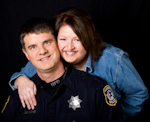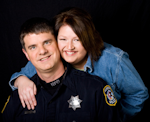Being Optimistic in a Typically Cynical Profession
In our last article (“Perils of Pessimism”) we looked at what often seems like an epidemic of pessimistic, glass-half-empty thinking both societally and in the law enforcement profession, some possible reasons why it seems to be on the rise, and the detrimental impact of a pessimistic outlook on emotional and physical health and wellbeing. Most importantly, we looked at the importance of historical perspective to counter the popular notion of a “world gone to hell in a hand-basket” that leads to such destructive pessimism.
But telling someone to simply “choose optimism” without offering any evidence about why seems trite, so here we hope to not only sell the point that optimism is both a choice you can willingly make and is very good for you, but offer some real-world evidence supporting an optimistic outlook.
Choosing your “habit of thinking”
Psychologist Martin Seligman, PhD, considered "the father of positive psychology," teaches that the contrasting optimist/pessimist dichotomy of perceiving the world are "habits of thinking,” and that each habit leads to very different outcomes. According to Seligman, those prone to pessimism (negative thinking) not only assume a “glass-half-empty” worldview, focusing on what’s wrong in the(ir) world, negative outcomes, and lowered expectations, but their pessimism also has measurable consequences. Pessimists “tend to give up more easily, feel depressed more often, and have poorer health than optimists. Optimists, on the other hand, generally do better in school, work, and extracurricular activities… often perform better than predicted on aptitude tests, are more likely to win elections when they run for office, have better overall health, and may even live longer.” (“The Mind and Body Benefits of Optimism” Dr Sherrie Bourg Carter, Psychology Today, 8/19/2012)
Although it is certainly possible pessimists underperform, fail more, have poorer health and a tendency toward depression to begin with, naturally and understandably feeding their pessimism, Seligman maintains – with research and decades of study and experience to support him – that an optimistic “habit of thinking” is something that can be chosen and fostered and highly likely to bear fruit. Whichever “habit of thinking” you choose will more likely lead to its expected outcome. And even when an optimist fails or her expectations are not met, she is quick to brush off disappointment, retain optimism, and plow on undeterred. The pessimist gives up or lowers his expectations even more to self-insure against pain. Of course, for the pessimist, mediocrity becomes the benchmark for success, such as it is.
If we do hold the power of choice over our outlook and whether we choose optimism over pessimism, why not work on developing a preferred – and positive – habit of thinking?
TRENDS TO SUPPORT AN OPTIMISTIC OUTLOOK
Many pessimists would surely defend their outlook and insist the glass is half-empty by pointing to the world around us and saying, “Just look! How can anyone be optimistic faced with all this? The optimist looks at the same world and feels hope and excitement for the future. The difference is, as we’ve proposed, a matter of perspective. The smart optimist isn’t oblivious to problems and challenges, but simply understands they’ve always existed and always will, but refuses to let that sully everything. The smart optimist understands we’re not promised Eden on Earth but is able to see what can be better, and what is already good, even amid the detritus of human nature that brings the pessimist down.
And so, for you, the smart cop reading this now, we offer the following evidence in support of optimism:
The continued and rapidly expanding growth of technology
The smart phones we carry with us everywhere – and cannot imagine living without – are tiny computers of such sophistication they dwarf the processing power of the computers NASA scientists used to put man on the moon. What’s even more impressive is that visionaries of that era were already laying their scientific foundations and predicting their existence in the days of the Space Race.
As much as each of us now relies on and, frankly, takes for granted technology that didn’t even exist for mass public consumption just 25 years ago, if you are in law enforcement today you are dealing with the flip side of all the good it has wrought. Technology has opened the door to unprecedented crime perpetrated by the computer savvy; we now see massive amounts of fraud and theft, child pornography, exploitation, extortion, cyberstalking, political and corporate espionage, and infiltrating, attacking and destroying others’ computer drives and all the info contained seemingly for the hell of it. Human depravity has a whole new platform to play out on, and victimization can come from next door or halfway across the globe.
So some people suck (and that’s why the police exist). The same technological frameworks would leave Sgt Joe Friday dumbfounded at the investigative power and reach of even the smallest, most remote police departments now. Although legwork, face-to-face contact, and interview & interrogation skills while running down leads will always be critical, technology has greatly enhanced efficiency and effectiveness. Much like with our cell phones, most of us shudder at the thought of not having the technologies we now enjoy even if we couldn’t imagine them when we hired on.
Our systems of government and law still work
Yes, they are frustrating. Yes, at any given time half or more of the electorate is outraged at something the current occupants of political office are doing (or merely that they exist) or, if they are supporters of said occupants, something their opposition is saying, doing, or planning. And yes, the legal system is set up to burden cops to a sometimes overwhelming degree.
And sometimes bad guys go free.
Through it all, the Fourth Estate examines policing through a critical lens, pundits parse the actions of a scared cop reacting to sudden, chaotic violence with the benefit of time and a panoramic, after-the-fact view, and public opinion is fickle and reactionary.
All frustrating but consider the alternative. Freedom takes a toll on those who could theoretically most threaten it, as it should, and I’m fine being held to high standards by a demanding and critical public. In turn, I strive to make sure my actions are always beyond reproach.
Police officers are, on the whole, an improving breed
Veteran officers have grown in response to technological advances and increasing demands of the job. Young, socially diverse and diversity-minded cops coming aboard with higher education and/or distinguished military service. Although some vets insist on becoming dinosaurs and more than a few of the kids need seasoning and firm direction, overall law enforcement’s future is in good hands.
People are living longer, and with better health, than ever
Although there has been a significant increase in certain health problems such as cardiovascular disease, diabetes, obesity, and certain cancers, it is also true that we are living longer than before and science and medicine are improving the lives and prognoses of those in poor health. It has been posited, in fact, that to some extent the rise in certain public health concerns correlates to physicians being better skilled at diagnosing and treating diseases that before would have quickly killed their hosts.
For those willing to be proactive with their own health, research into diet and exercise, along with the proliferation of gyms, health clubs, yoga studios, and opportunities to get and stay physically active, increase not only longevity but also quality of life. In the years since my and Althea’s births, our life expectancies have increased by nearly a decade each and continue to grow even as we age. Some scientists believe the first person who will live 150 years has already been born.
Crimes rates are way down since their modern peak in the early 90s
The work you do makes a real difference, and has decades now. We touched on this before, and have periodically in other writings, but after peaking in categories of both property and violent crime we have returned to a crime rate comparable to that in the late 60s and, in terms of violent crime, comparable to or better than the early 60s. Most people don’t know this – they see the news, personalize the list of often sensationalized crime (“if it bleeds, it leads”), mentally shrink the world around them to imagine all this mayhem in their own backyard, and imagine society is collapsing. A lot of cops do this, too; it’s hard not to when dealing with crime is your primary job. The truth is modern law enforcement is making a difference. YOU are making a difference.
It can be hard, but as much as you can choose optimism. You just need to refine and practice your “habits of thinking.”
Have Fun,
Stay Safe,
And GOOD JOB!

Michael Wasilewski
Althea Olson, LCSW and Mike Wasilewski, MSW have been married since 1994. Mike works full-time as a police officer for a large suburban Chicago agency while Althea is a social worker in private practice in Joliet & Naperville, IL. They have been popular contributors of Officer.com since 2007 writing on a wide range of topics to include officer wellness, relationships, mental health, morale, and ethics. Their writing led to them developing More Than A Cop, and traveling the country as trainers teaching “survival skills off the street.” They can be contacted at [email protected] and can be followed on Facebook or Twitter at More Than A Cop, or check out their website www.MoreThanACop.com.

Althea Olson
Althea Olson, LCSW and Mike Wasilewski, MSW have been married since 1994. Mike works full-time as a police officer for a large suburban Chicago agency while Althea is a social worker in private practice in Joliet & Naperville, IL. They have been popular contributors of Officer.com since 2007 writing on a wide range of topics to include officer wellness, relationships, mental health, morale, and ethics. Their writing led to them developing More Than A Cop, and traveling the country as trainers teaching “survival skills off the street.” They can be contacted at [email protected] and can be followed on Facebook or Twitter at More Than A Cop, or check out their website www.MoreThanACop.com.


